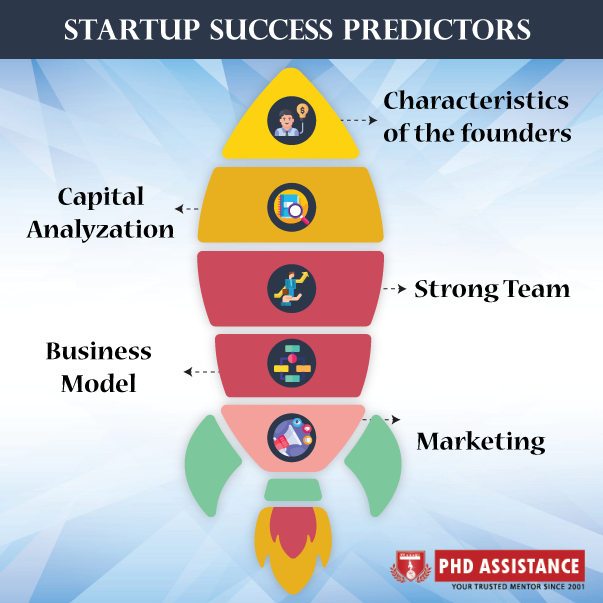Introduction to Startup success Predictors
Introduction
Nowadays, entrepreneurs turn their innovative thoughts to ventures which provide solutions to global problems. As a result, a start-up venture has the potential to grow into enterprises that have a global effect. Many entrepreneurs hope for a success and financial gain when they start their business. Some people want to accumulate assets, while others want to start, grow, and lead a long-term business but not everyone is born with the talent and luck to be the next big thing. Oprah Winfrey, Richard Branson, or Michael Dell is just a few of the people who have made a name for themselves.

Copy of PA-TAILOR-MADE ACADEMIC-PHRASES TO WRITE AN IMPRESSIVE DOCUMENT
Startup success Predictors
Many factors can contribute to a startup’s success or failure; nonetheless, studies have discovered a link between a new venture’s managing team and its success or failure. [1]. In a start-up, founders are the catalysts for new goods, services, and business models to enter the marketplace. With the need to attract people into the business, the founder’s relationship to the company and its stakeholders will alter. Given the importance of a Founder’s position in the firm’s architecture, it’s likely that he or she will be promoted to management or the board of directors [2].
Anyone may now establish a business because of the present business environment. However, it takes a lot more than a good business environment to keep it going and turn it into a viable company. However, sustaining and converting it into a profitable venture takes a lot more than just a favorable environment. Here are a few key distinguishing elements that indicate a startup’s likelihood of success.
Figure 1: Startup Success Predictors
Characteristics of the founders
For a startup to be successful, characteristics of the founder plays as major role as forms the foundation of the business. Their qualities might determine where the startup culture begins and how it relates with the business environment. Human capital, which is regarded a vital determinant for organizational success, has been identified as having relevant attributes such as experience, expertise, age, and education of the founder. Entrepreneurial talent is influenced by the expertise and talents of the founders, and there is a strong relation between a founder and performance. [3].
Capital Analyzation
Working capital is also crucial for a startup’s success as early phases of investment. Even if obtaining initial fund financing proves challenging, a line of credit is still an option. Any startup that does not have enough financing would suffocate under its own debt, and securing appropriate finance will necessitate a sound business strategy [5]. Since, the Capital has a direct and indirect impact on performance, the lack of capital would certainly lead to the startups failure [6], [7].
Strong Team
Even if you have extraordinary entrepreneurial characteristics, it’s difficult to achieve tremendous success alone, thus putting together the proper team is critical to every successful firm. The size of the founding team has an impact on business success as it acts as a catalyst for the accumulation of entrepreneurial potential. Despite the fact that the size of a team’s founder has been shown to have a beneficial influence on performance, a larger team does not ensure better results.
Business Model
An excellent business idea, according to Nyman [5], is just one part of a larger business concept. It’s critical to follow through and think about the other components of your business model as well, regardless of how large or small your company is. A business model for a startup highlights building a method in order to consistently fulfill value promises and pave the route for the business expansion [8].
Marketing
Every company initiative, large or little, relies on marketing to allow clients to genuinely interact with the product. Marketing has been incredibly cost-effective with the emergence of digital media, and is thus an essential component of a startup’s success. According to Lussier et al. [4], business founders having past marketing experience contribute considerably to their company’s performance.
Every stage of the business is connected, from putting a concept on paper to carrying it through. Even the poor management of a single stage might compromise the entire chain and thus it’s vital to realize that a business isn’t built only on a brilliant concept rather, it needs a strong team, founders capabilities, a suitable business model, a funding capital and the marketing strategies. Thus, the proper operation of these elements is critical for a startup’s growth and development.
References
[1] J. C. Picken, “From founder to CEO: An entrepreneur’s roadmap,” Bus. Horiz., vol. 60, no. 1, pp. 7–14, Jan. 2017, doi: 10.1016/j.bushor.2016.09.004.
[2] M. R. White, “Motivations, Experience, and Personality Types of Start-up Founders.” University of Oregon, 2020, [Online]. Available: https://scholarsbank.uoregon.edu/xmlui/handle/1794/25826.
[3] J. A. Felício, E. Couto, and J. Caiado, “Human capital, social capital and organizational performance,” Manag. Decis., vol. 52, no. 2, pp. 350–364, Mar. 2014, doi: 10.1108/MD-04-2013-0260.
[4] C. Nyman, “Finnish Startups: Success factors, challenges and reasons for failure,” 2020, [Online]. Available: https://www.theseus.fi/handle/10024/340480.
[5] S. Hyder and R. N. Lussier, “Why businesses succeed or fail: a study on small businesses in Pakistan,” J. Entrep. Emerg. Econ., vol. 8, no. 1, pp. 82–100, Mar. 2016, doi: 10.1108/JEEE-03-2015-0020.
[6] R. N. Lussier and S. Maron, “A Business Success versus Failure Prediction Model for Small Businesses in Israel,” Bus. Econ. Res., vol. 4, no. 2, pp. 63–81, 2014, [Online]. Available: https://repositorio-aberto.up.pt/bitstream/10216/86067/2/157022.pdf.
[7] J. Weking, T. P. Böttcher, S. Hermes, and A. Hein, “Does business model matter for startup success? A quantitative analysis,” 2019, [Online]. Available: https://aisel.aisnet.org/ecis2019_rip/77/.



